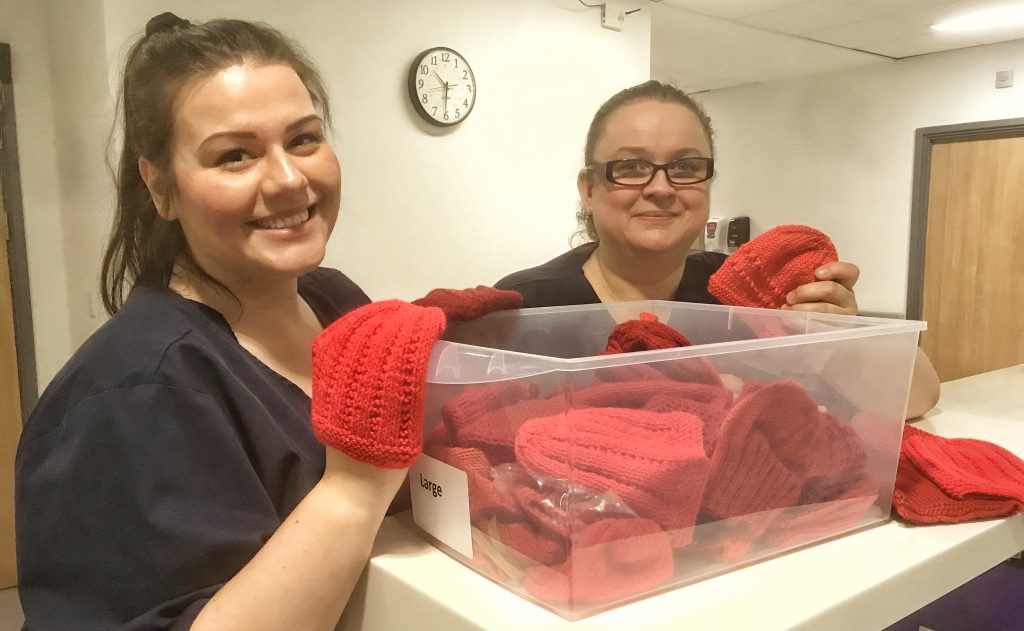News from our partners: Hospital team aims to reduce Neonatal admissions
News from our partners Shrewsbury and Telford Hospital NHS Trust (SaTH)
A team at the Trust which runs Shropshire’s two acute hospitals is developing new ways of working to try to reduce the number of full-term babies unexpectedly admitted onto the Neonatal Unit.
As part of a national project called ATAIN (Avoiding Term Admissions Into Neonatal units) the Shrewsbury and Telford Hospital NHS Trust (SaTH) is using a novel method to keep mums and babies together.
There are four main reasons why babies born at term (after 37 weeks) may be admitted unexpectedly onto a Neonatal Unit. These are: breathing problems, low blood sugar, jaundice and asphyxia.
Elizabeth Pearson, Quality Improvement Lead Midwife at SaTH, said:
“Having a baby transferred to the Neonatal Unit can be incredibly stressful for the parents. Not only do they have the worry about the health of their baby, but they are also separated from them which can naturally leave them feeling anxious.
“As a Trust we are not only looking at ways of reducing admissions onto the Neonatal Unit but also at ways of carrying out some procedures which traditionally would have taken place on the Unit at the bedside on the Postnatal Ward instead, so that mum and baby can stay together.”
Skin-to-skin contact is encouraged after the birth of the baby, which brings benefits including regulating the baby’s heartbeat, temperature and breathing and encouraging feeding.
To reduce instances of respiratory problems there has been a drive to identify babies who may be at risk, for example babies born weighing less than expected. Those babies that are identified are given a knitted red hat to wear, which identifies them as requiring regular observations and maintains their temperature by keeping their heads warm.
Elizabeth said:
“Thanks to collaborative working with the Shropshire and Telford & Wrekin Maternity Voice Partnership we have an incredible supply of knitted hats for the wards.”
To reduce admissions for hypoglycaemia, new procedures have been put in place allowing Midwives to administer oral glucose gel to newborn babies with low blood sugars, which prevents the problem from deteriorating, avoiding the need for admission to the Neonatal Unit.
To reduce the risk of babies developing low blood sugar, different medication is now given if a woman develops high blood pressure in labour and needs a one-off dose of medication to correct this, as certain types of medication are known to increase the risk of low blood sugar in newborn babies.
Elizabeth added:
“To reduce the risk of further separation from their mothers, babies that require cannulation (where a small plastic tube is inserted to allow medication to be given) are now treated, with consent, at the mother’s bedside rather than being transferred to the Neonatal Unit for the cannula to be inserted.”
Overseeing this work, regular meetings are held between clinicians from a range of specialities including the lead Obstetric and Neonatal Consultants, the Maternity Matron, Delivery Suite Managers, Neonatal Unit Manager, Advanced Neonatal Nurse Practitioner, Postnatal Ward Manager, Neonatal Unit Sister, Delivery Suite Co-ordinator, Education Midwife and Quality Improvement Lead Midwife.
The team has also linked with other Neonatal Units both inside and outside of the region to give assurances on the work taking place. E-learning has begun for all maternity and neonatal nursing and medical staff, and staff training at medical induction and midwifery training updates on neonatal resuscitation both include ATAIN information.
Elizabeth said:
“Babies are reviewed by senior staff before being transferred to the Neonatal Unit and separated from their mothers.
“We are aiming to keep our term admission rate below 5% of our monthly births. In January last year our rate was 5.9% but in January this year that had fallen to 3.8% – a good reflection of the success of the work being done.”


